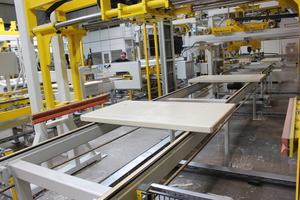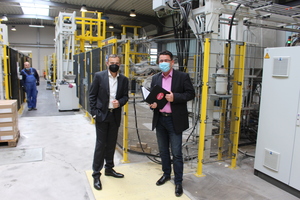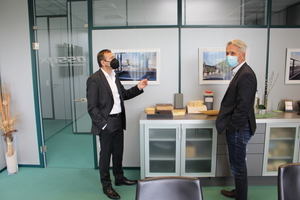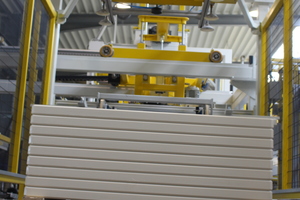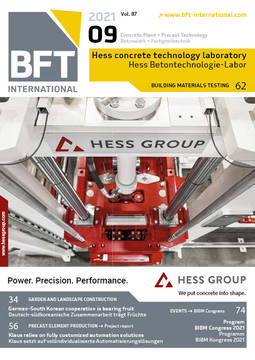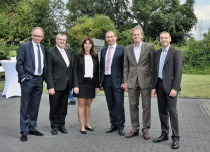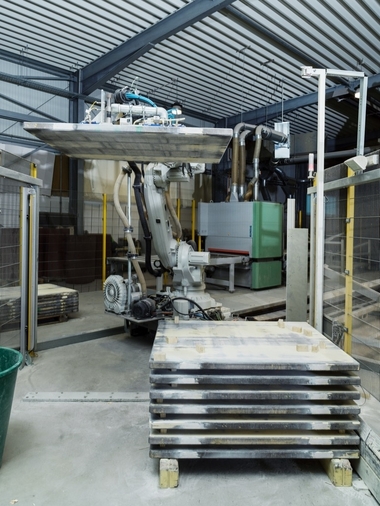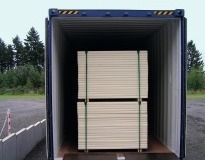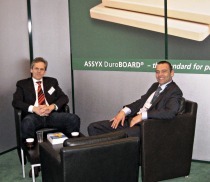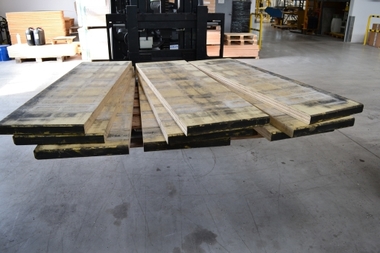BFT team visits new manufacturing facility in Andernach
The DuroBoard production board developed by Andernach-based Assyx GmbH & Co. KG has been in use in many concrete block production plants around the globe for 15 years. It is produced in all standard sizes between 800 and 1,800 mm wide, 500 to 1,400 mm long, and 30 to 60 mm thick.
The high-performance production board consists of a wood-plastic composite, that is, of a high-quality LVL (laminated veneer lumber) wooden core which, according to the manufacturer’s specification, is fully and inseparably coated with Baydur polyurethane (manufactured by Covestro Deutschland AG, formerly Bayer Material Science AG) in a production process that is unique in the market. The wood core is produced mainly from European spruce/fir (Kerto-Q brand from Finnish supplier Metsä Wood). The apparent density of the wooden core ranges from 500 to 650 kg/m³; while the full, inseparable, airtight and watertight polyurethane coating is 2.5 to 3.0 mm thick. The wooden core is overmolded with polyurethane in a closed mold. Due to the production process, a so-called sprue mark is visible on one end face, and four circular marks are discernible on one side of the board. These are caused by so-called ejectors needed to remove the boards, but do not constitute a quality defect. The working edges are enclosed in a 300 g/m² fiberglass mat for reinforcement, and the Assyx DuroBoard can additionally be fitted with an RFID chip in accordance with customer requirements. The beveled edges (14 x 14 mm) and circumferential chamfer (7 x 7 mm) at its top and bottom give the production board a distinctive design and ensure smooth circulation in all standard handling systems.
DuroBoard specifications
wear-resistant and abrasion-proof
weather-resistant and therefore suitable for outdoor storage
temperature-proof from -25°C to +90°C and therefore highly suitable for curing chambers and vapor systems
waterproof, permitting easy scouring
resistant to chemicals
highly resistant to bending: elastic modulus of wooden core ≥ 10,000 N/mm² (almost similar to hardwood)
highly impact-resistant and therefore free from cracking
highly break-proof, does not break when dropped
easy handling similar to wood
optimum vibration transmission over the entire, very long service life as its properties do not change due to the all-round coating
draw plates are no longer required
poor lifting, cracking, and different strengths in a single block belong to the past
increase in production by approx. 25% and therefore rapid investment amortization.
Second manufacturing facility in operation
Due to increasing demand, a second manufacturing facility has recently been put into operation at the company’s headquarters in Andernach. As a result, the plant’s capacity has doubled from 120,000 to 240,000 boards per year. Dipl.-Ing. Alfred Rochlus from Assyx says: “Personally, I joined the company in 2007 and have been Shareholder since 2015. Just four years later, in 2019, we had reached the limits of our capacity with the existing plant; downtimes were also to be minimized – so we had to act quickly and invest a seven-figure sum. Now we are proud to say that the new high-precision production process has been tailored to our three-shift operation and is, of course, protected by patent. In addition, a specific spacer technology gives us a unique selling point.”
Active in recycling
Assyx is also very active in terms of recycling: once the polyurethane has reached the end of its service life, for example, it can be recycled as a polyol and therefore fed back into production. The plastic polyurethane consists of the two components polyol and isocyanate. Half of it is stored in four 25-ton tanks. In addition, the workshop is heated in winter using the waste heat from the air compressors. Most renowned concrete block producers from Germany and other European countries are among the company’s customers, such as Rinn and Kronimus (Germany), Brukbet (Poland), Alkern (France), or Steypustödin (Iceland).
“Things are moving forward despite the fact that the Corona crisis has not yet been fully overcome. Since many concrete block producers have begun investing again, we are not afraid of the future”, concludes Alfred Rochlus.

